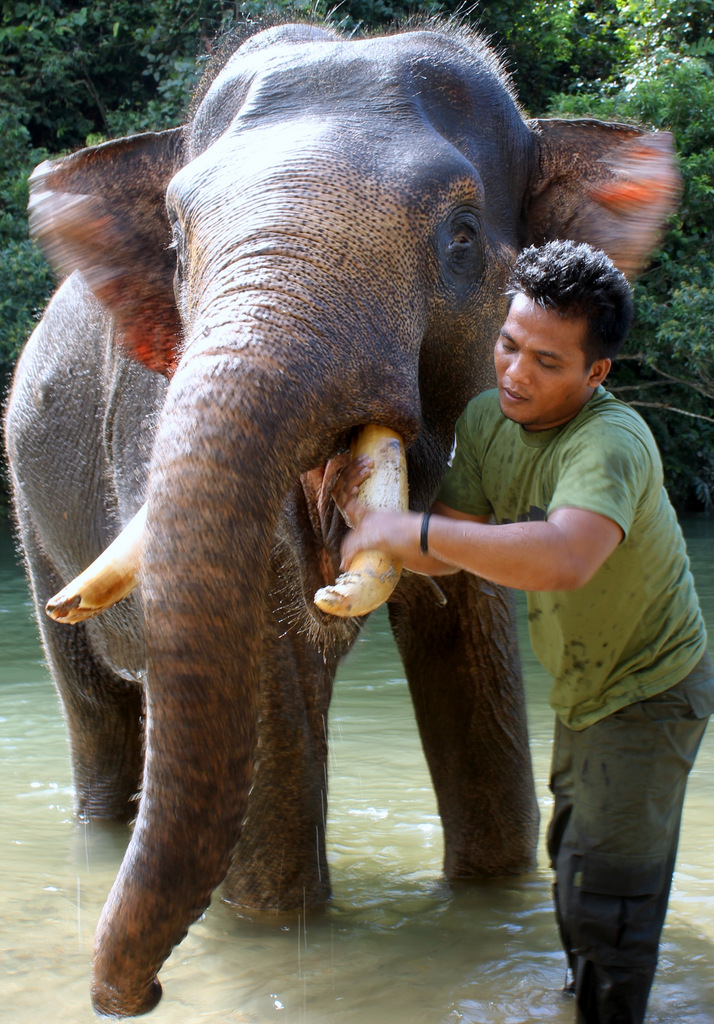Anggiat
This portrait is about Anggiat, he was the first mahout (elephant trainer) on the team at the Sampoiniet Conservation Response Unit (CRU, see project description). Our first conversation was while he played his guitar, making me listen to Aceh music. Unlike some other guys on the team, he is outgoing and was happy to talk to me about his relationship with wild elephants. While speaking with him, I could tell he had great pride in his work, especially in the context of the CRU, where his purpose is to make a positive impact on local communities and the environment.
In Anggiat’s life, living with elephants is a family affair. His father was, in fact, a mahout at Sareh, the government camp. His father was very close to the elephants and considered them friends. However, at first Anggiat, “didn’t like elephants,” and started off as a truck driver between Medan and Jakarta. It was only after the influence of his father that he started working with elephants.
The first training he had as a mahout was working with an elephant not yet domesticated: “It was very scary, it [the elephant] looked at me as if he wanted to kill me.” But his father advised him to be patient because working with elephants takes time. Anggiat’s first success brought him “great joy.” His father advised him again to be patient when Anggiat began to tire of his work in Sareh, especially the low pay. His father told him that when he began the pay was five times lower that what it is now, this taught Anggiat humility. Anggiat still has the idea: “if my father does, I can do it” that allowed him to feel proud of his work, even if “my friends told me it was a dangerous and stinky job.”
After an opportunity to take a few elephants to the island of Java for tourism fell through, Anggiat became a candidate to be a part of the CRU Sampoiniet mahouts. He had heard of Tangkahan CRU (the first CRU, located near Medan) and also wanted to “be part of the experience.” He began working in Sampoiniet in 2009.
When he spoke about the conflicts with elephants, he made a funny comparison, “it’s like the head of a bald person who loses his hair, [hair corresponding to the elephant habitat, baldness referring to man extending into the elephant habitat], after awhile there is not enough habitat left for the elephants, the elephants find themselves compelled to go on human territory.” For that, he blames the government. He accuses them of selling land belonging to protected areas, which he says, “reduces the elephant habitat and greatly increases the number of conflicts.” His place at the CRU at least allows him to help farmers affected by these conflicts. He told me that his first action against the attacks of a wild elephant left a great impression on him, the elephant was much larger than their own. “I stayed because it was important for me to help the villagers and the wild elephants that are still alive.”
For him, the CRUs have a positive impact because they facilitate the management of conflicts between humans and elephants by, “allowing the villagers to continue working in their fields without fear and we [mahouts] can send the wild elephants on new paths.” He says they need more support from the government to ensure that law enforcement is consistent so the “elephant’s habitat is respected.” He also thinks they need more training for the mahouts, like learning to speak English in order to better communicate and explain the problems to foreigners who come to the camp. Conflicts with elephants happen in several other places around Sumatra. Anggiat would also like to develop an exchange system, “so we can see how they act to mitigate conflicts and also we can show them our actions.” According to him, this would allow for a more generalized way to protect the Sumatran elephant.

